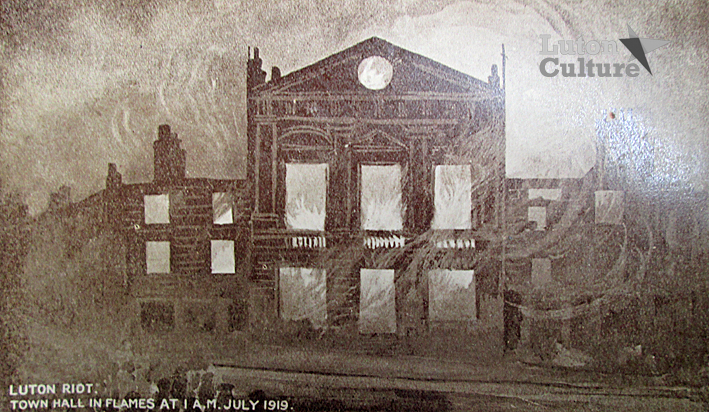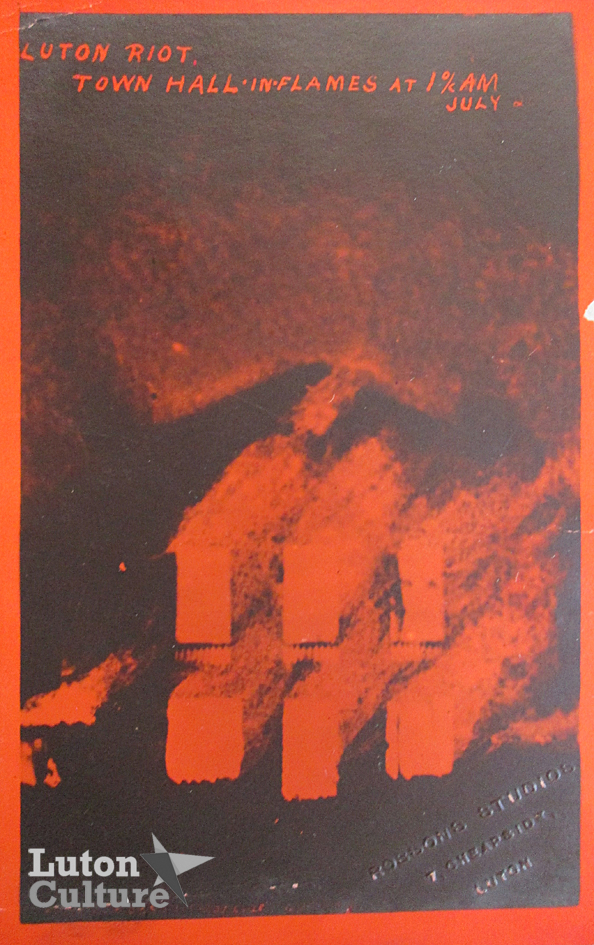
[The Luton Reporter: Tuesday, July 22th, 1919]
According to all appearances the beginning of the night's trouble was with a gang of noisy young fellows who started pelting the Town Hall windows. Like all movements of this kind, it soon gathered force of numbers and prominent among the adherents were men in khaki and also women.
As in the afternoon a rush was made for the main doors, but these had been barricaded as well as securely fastened, and although the crowd reached them they could not break them open. Instead they set to work to smash all the windows and this they did one by one, not only in front but also the windows of the Food Office in Manchester Street. Here a fire was started and the fire brigade was called out.
Chief Officer Alexander Andrew turned out with one of the engines, driving through Williamson Street into Manchester Street, and got through the crowd all right, but as soon as he and his colleagues pulled up and started to work the crowd commenced to attack them. Firemen Garrett and Burgess, one of them a discharged soldier, were injured and, in consequence of the shortage of men, Chief Officer Andrew had no option but to give up the task and return to the station. Nevertheless, the Mayor's Sergeant and the Town Hall caretaker were able to get to work on the flames with buckets of water from inside the building, and valiantly they worked.
It is believed that they succeeded in quelling this outbreak, but no sooner had they met with this success than another and more serious fire broke out in the Town Clerk's general office. A party broke into the shop of Herts Motors Ltd [70 George Street] by smashing the panelled doors and also a side window, and fetched out a two-gallon tin of petrol. It is not clear if any part of this was used to ferment the first fire, but eye-witnesses aver definitely it was the cause of the second, and by the time the fire brigade got back to the scene practically the whole of the front of the building was well alight, the flames sweeping up the stairs from the general offices and being fanned by the draught from the smashed windows right through the main building.
 It would have been a pretty stiff task for the brigade under any circumstances, but as it was they were rendered powerless by the action of the crowd. By taking a roundabout course and driving without lights, Chief Officer Andrew was able to get into Dunstable Place unobserved and connected up with two hydrants in Upper George Street, and afterwards from others in Gordon Street, Dunstable Place and Manchester Street, but for hours they were able to do little in the way of fire-fighting.
It would have been a pretty stiff task for the brigade under any circumstances, but as it was they were rendered powerless by the action of the crowd. By taking a roundabout course and driving without lights, Chief Officer Andrew was able to get into Dunstable Place unobserved and connected up with two hydrants in Upper George Street, and afterwards from others in Gordon Street, Dunstable Place and Manchester Street, but for hours they were able to do little in the way of fire-fighting.
The crowd showed every determination to prevent them playing on the flames. Wherever they could get hold of the hose they cut it into ribbons and, not, content with this, they pelted the firemen with everything they could lay their hands on – pieces of iron, brick, broken bottles, glass and goodness knows what.
The firemen stuck to their posts like heroes, but the odds against them were too great. They were like so many cockshies to be aimed at and the only word which will describe the scene is slaughter. One after another the firemen went down like logs, either from kicks or blows from missiles.
As they went down the police and a number of civilians, including some discharged soldiers, took their places, and in self defence the firemen were compelled to adopt the policy of directing the hose on the crowd.
Altogether the firemen had seven jets going, but for something like three hours they were more engaged in turning them on the crowd than on the burning building. The police lined up and made one or two charges and some people in the crowd were hurt, but the police were so hopelessly outnumbered that they fared as badly as the firemen.
Some of the crowd fought as viciously as wild beasts, and bitterly do the police and firemen complain of a number of men in khaki. These men deliberately pelted them with all sorts of missiles at short range and there was a regular pitched battle at the lower end of Upper George Street.
When the firemen overpowered their assailants with the use of the hose, the latter went round the other way and attacked them from the rear.

